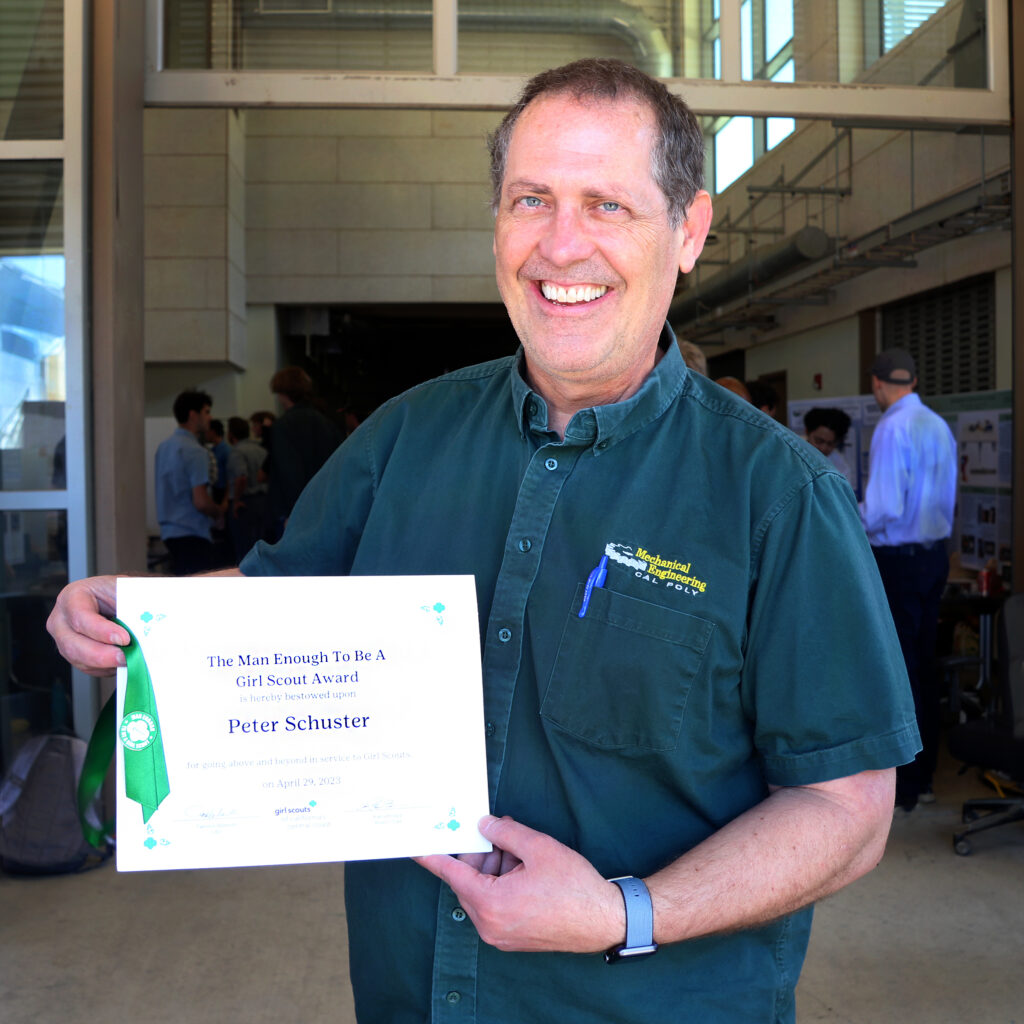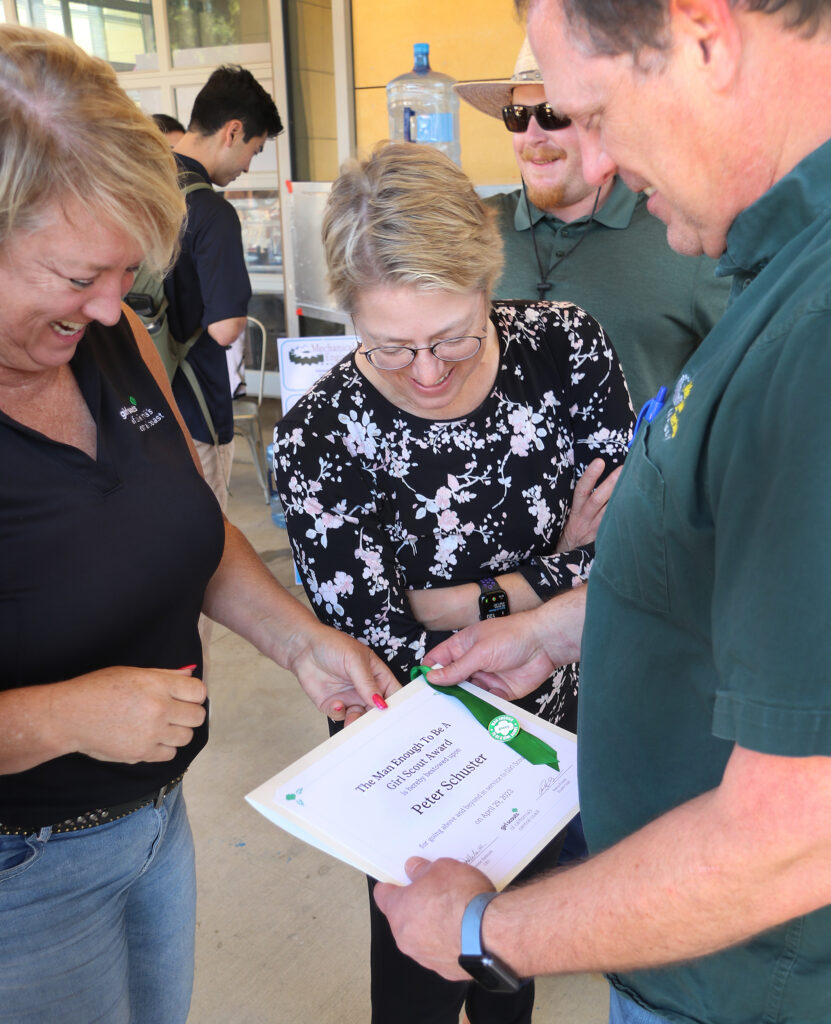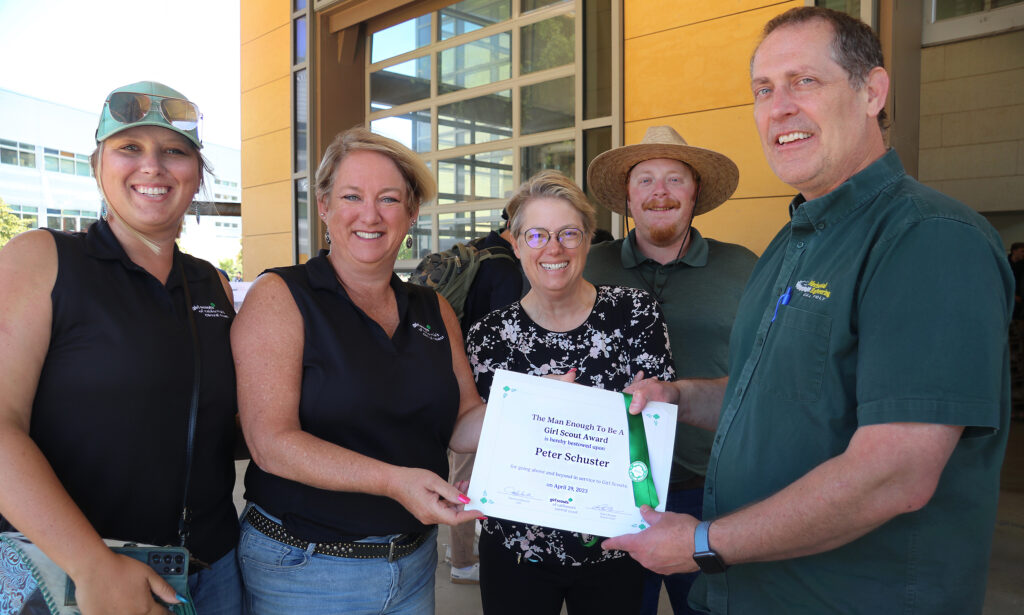Professor Peter Schuster named Man Enough to be a Girl Scout

Mechanical Engineering Professor Peter Schuster is officially man enough to be a Girl Scout.
The senior project organizer was honored by Girl Scouts of California’s Central Coast for his contributions to the community, earning him the title of Man Enough to be a Girl Scout recipient.
Only four volunteers out of more than 4,000 received the award this year, according to CEO Tammie Helmuth, who oversees the Central Coast council and its growing membership of over 5,700 girls.
“I didn’t even know this award existed, but I was really excited to be selected,” said Schuster with a big grin.
Over the last two years, he has forged a partnership with the Girl Scouts and enlisted close to 40 engineering students to design and construct five devices ranging from a weed robot to rapid composter.
“The projects have been good open-ended design challenges that also have an element of user interaction,” Schuster said. “It’s important for mechanical engineering students to understand the user’s needs, and they can also feel good about giving back to the community.”
Helmuth lauded Schuster’s enthusiasm around the collaboration that has far-reaching effects.
“My role is to get girls involved in engineering, and through the relationship between our council and Cal Poly, our Girl Scouts see who they can be,” she said.
Making it on the Senior Project List
Schuster’s ties to Girl Scouts go back to age 10, when he climbed in the hay barn as his older sisters gathered with their mounted troop.
He later completed his undergraduate education at Cornell University, then enrolled in a master’s program to enter the research field.
Schuster wasn’t passionate about the pursuit, however, so he went to work for Ford Motor Co., but after 10 years in industry, the pull of academia proved too strong. He missed the deadline for the first faculty position that opened at Cal Poly but was successful the next year and started his tenure in 2003.

“I love the teaching part of my job, and Cal Poly is one of the few places you can really focus on teaching,” he said.
The last eight years Schuster has served as the Mechanical Engineering Department’s senior project organizer – identifying projects, making connections with industry and student clubs, planning kickoff events and forming teams.
His starting point is soliciting requests each year from businesses, community groups and other faculty members, then assigning projects to the 60-plus teams he forms over the academic year.
Schuster first connected with the Girl Scouts of California’s Central Coast during the COVID pandemic when they sought help with their cookie program.
COVID had hampered the Girl Scout Cookie Program, so community leaders conceived of a robotic Girl Scout that could act as a surrogate when positioned outside storefronts, alerting passersby to the presence of Thin Mints, Samoas and other favorites.
Schuster enlisted industrial and manufacturing, computer and mechanical engineering majors to construct the device and while the students didn’t entirely fulfill their aims, both groups learned valuable lessons.
“It was an interesting experiment,” he recounted. “We achieved some of our goals, but the main thing is that the Girl Scouts made it onto my senior project list.”
A Win for Everyone
Teams this year worked on projects ranging from robotics to ranching and were eager to show off their progress during the Engineering Project Expo on June 2.
Mechanical and computer engineering students teamed up to build a robotic monarch butterfly that can talk to visitors as part of an educational display. The device needs more modifications, but Helmuth is excited about integrating the butterfly into lessons about nature.

More mechanical engineering seniors worked on a rapid composter for the 36-acre Camp Arnaz Program Center in Ventura. As an alternative to shipping out the manure from the horses that populate the ranch, the council enlisted Cal Poly students to build a composter that could quickly process manure.
The device has the capacity to turn 200 pounds of manure into compost in three weeks, and Helmuth couldn’t be happier.
“Students can take these projects to market, and they also help the environment,” said Helmuth, who enthusiastically interacted with the teams and their devices during the expo. “It’s a win for everyone.”
Another team constructed a solar-powered weed robot designed to recognize and cut weeds and invasive plants. The device attracted interested passersby while on display outside Bonderson Projects Center.
Helmuth said the innovative project will return next year so students can program the weed robot to run autonomously.
Another project that will continue involves the creation of steppingstones that will light up and play music as people walk through the council’s winter wonderland.
“The hope is that the Girl Scouts will benefit from these projects and that they will be able to see college students who are actively pursuing engineering,” Schuster said.
